 Petzlover
Petzlover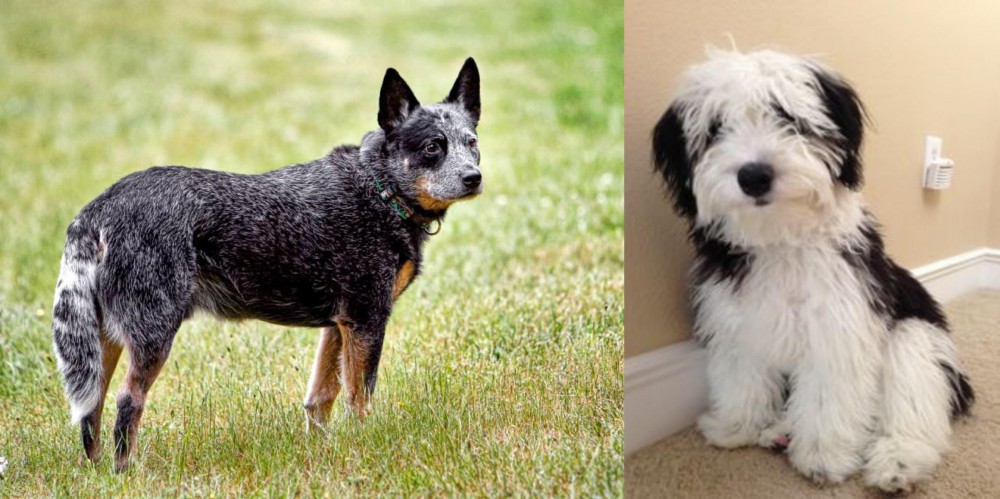 Austrailian Blue Heeler is originated from Australia but Mini Sheepadoodles is originated from United States. Both Austrailian Blue Heeler and Mini Sheepadoodles are having almost same height. Both Austrailian Blue Heeler and Mini Sheepadoodles are having almost same weight. Both Austrailian Blue Heeler and Mini Sheepadoodles has almost same life span. Both Austrailian Blue Heeler and Mini Sheepadoodles has almost same litter size. Austrailian Blue Heeler requires High Maintenance. But Mini Sheepadoodles requires Moderate Maintenance
Austrailian Blue Heeler is originated from Australia but Mini Sheepadoodles is originated from United States. Both Austrailian Blue Heeler and Mini Sheepadoodles are having almost same height. Both Austrailian Blue Heeler and Mini Sheepadoodles are having almost same weight. Both Austrailian Blue Heeler and Mini Sheepadoodles has almost same life span. Both Austrailian Blue Heeler and Mini Sheepadoodles has almost same litter size. Austrailian Blue Heeler requires High Maintenance. But Mini Sheepadoodles requires Moderate Maintenance
 In 1840, George Elliott made a match with Australian Dingo and Collie and got a clever and very active dog breed – Australian Blue Heeler. Soon, he showed his good herding instincts and protective nature and got really popular among the cattlemen and ranchers. Soon, as the USA soldiers arrived in Australia, they decided that it will be a great dog to bring home.
In 1840, George Elliott made a match with Australian Dingo and Collie and got a clever and very active dog breed – Australian Blue Heeler. Soon, he showed his good herding instincts and protective nature and got really popular among the cattlemen and ranchers. Soon, as the USA soldiers arrived in Australia, they decided that it will be a great dog to bring home.
Australian Blue Heeler has short, double coat. The coat is water resistant and helps them when the temperature is too high as well. Their coat is rough to the touch, naturally. They can be found in blue or red coat colour mix. The Blue Heeler isn’t actually blue, but their black coat has a bluish tint. Red Heelers have red fur instead of black. They have long tails, strong legs, Dingo-like heads with pointy ears and muscular necks and balanced and athletic bodies.
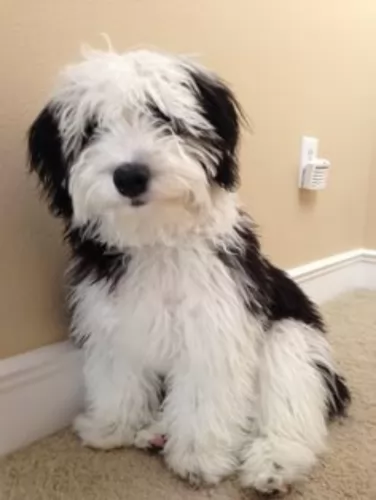 The Mini Sheepadoodle is such a sweet, teddy bear of a dog. It comes from two awesome dog breeds – the Old English Sheepdog and the Miniature Poodle. It is thought that the dog originated in the USA.
The Mini Sheepadoodle is such a sweet, teddy bear of a dog. It comes from two awesome dog breeds – the Old English Sheepdog and the Miniature Poodle. It is thought that the dog originated in the USA.
They are two very different looking dogs, but their personalities are fairly similar. This designer dog isn’t purebred and isn’t registered with the American Kennel Club (AKC).
 This breed is somehow designed for an outdoor life and outdoor activity. This implies that Blue Heelers have nature made of the high dose of energy. They are always ready to go anywhere you go, and they will be a loyal friend. They are actually very clever, intelligent and ready to help.
This breed is somehow designed for an outdoor life and outdoor activity. This implies that Blue Heelers have nature made of the high dose of energy. They are always ready to go anywhere you go, and they will be a loyal friend. They are actually very clever, intelligent and ready to help.
If you are a type of the person who prefers being indoors and having minimal physical activity, Blue heelers are not the type of a furry companion for you. They have a high daily need for the activity, and they love having lots of space to run and explore. Sometimes, you will realize that having a leash is a must because they will get so playful that they will forget about you!
If you start teaching them to be friendly with other dogs while they are still pups, they will accept that kind of lifestyle. But, if your Blue Heeler is raised as the only dog on the ranch, note that they won’t be very friendly toward other dogs.
Since most of the herd dogs usually respond to only one person, most of the Blue Heelers can follow this old instinct. They can be very independent, as well, and they are usually not the type of the dog that will always be around your leg waiting for a cuddle or ear scratch. But, they build the respect towards humans depending on how they treat him so they can be very lovable and friendly pets.
If you are still confused about their name, you must know that the Blue Heelers can actually lightly nip your heel for attention. They are not aggressive, but they tend to be very protective of the family, humans around them and their property.
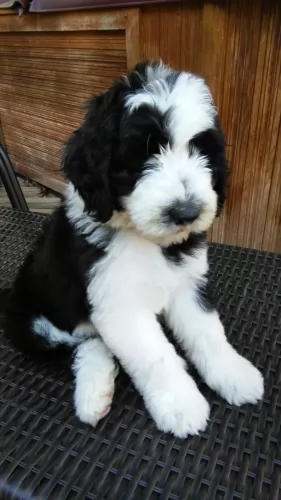 The Mini Sheepadoodle, a mix between the Mini Poodle and Sheepdog stands at between 48 and 52cm and weighs between 11 to 20kg.
The Mini Sheepadoodle, a mix between the Mini Poodle and Sheepdog stands at between 48 and 52cm and weighs between 11 to 20kg.
He is solidly built with a broad skull and face. The coat is usually medium length and can be either straight, wavy or curly. The coat can be quite a few colors depending on the parents. Some are brown, cream or black while others are white and grey or white and brown.
He is a low shedding dog. He has a double coat which will still need brushing. This hybrid breed has a thick coat that will need to be trimmed professionally every now and then as well. This is good for hot weather and for reducing the time it takes to groom the pet.
They’re easy-going, social dogs, loving to spend time with their human families. They are gentle and patient with children and they get on well with other pets in the home as well.
The Poodle is a very intelligent dog and because there is Poodle in the Mini Sheepadoodle, you can be sure that your dog is going to be bright too and that he will be able to be trained and socialized with ease. They’re friendly and don’t do too well as watchdogs.
 They are generally good with children, but you must be aware of their inherent desire to herd. Always supervise when your Blue Heeler is around small children.
They are generally good with children, but you must be aware of their inherent desire to herd. Always supervise when your Blue Heeler is around small children.
Ball tricks, frisbee fun, running companion, herding cattle.
It is best to buy a puppy. These dogs get attached to one human and to the territory.
They are generally quick learners. If you teach them to be playful, friendly and loving, they will learn it in no time. So be aware of the decisions that can cost you when the dog grows up.
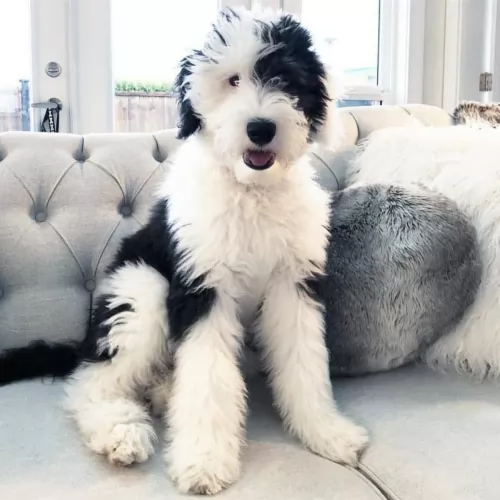 The Mini Sheepadoodle is such an affectionate teddy-bear dog and is calm, gentle and loving.
The Mini Sheepadoodle is such an affectionate teddy-bear dog and is calm, gentle and loving.
They make perfect family pets and want to please their owners. He is friendly and gets on well with his human family as well as with other pets in the home.
Children love him as he is always willing to have a game. They’re sociable and playful and make a wonderful canine pet and companion in your home.
 Progressive Retinal Atrophy usually causes slow and painless loss of sight. This process takes years, but there are cases where this disease took only months before the dog ended up completely blind.
It is advisable to take your Blue Heeler to the vet for a test that can tell you if your dog is carrying the gene for this disease.
Progressive Retinal Atrophy usually causes slow and painless loss of sight. This process takes years, but there are cases where this disease took only months before the dog ended up completely blind.
It is advisable to take your Blue Heeler to the vet for a test that can tell you if your dog is carrying the gene for this disease.
Lens luxation is a disease where the lens of dog’s eye separates partially or completely. Good news is that this disease can be treated.
Most common is the hip or elbow dysplasia. This is the disease where hip joints do not develop properly and begin to grind. This condition can sometimes be treated with physiotherapy, but there is a chance that your Blue Heeler will need a surgery. If you have a habit of regular vet checks and keeping your dog slim and fed with quality food, you can a make a big difference.
Osteochondritis Dissecans (OCD) causes the dog to have excess cartilage and deficient bone, where cartilage does not get replaced by bone during fetal development. This disease usually requires surgery and prescribed medicines.
Congenital hereditary sensorineural deafness – CHSD is a common form of deafness.
Bilateral deafness can be identified when the dog is still a puppy, more-less at six weeks of age. A puppy with deafness in only one ear is harder to identify, but it can happen.
Portosystemic shunt means that the blood flow is getting back into the bloodstream instead of passing through the liver. That means that liver can’t clear out the toxins, and the organ itself fails to grow properly. This inherited type of shunt can be treated with surgery if the diagnose is set on time.
 They’re healthy dogs and you’re not likely to be spending too much time at the vet. Every dog can be prone to any one of the many common dog illnesses there are. These can be hip dysplasia, obesity, bloat, dental disease, cataracts and more.
They’re healthy dogs and you’re not likely to be spending too much time at the vet. Every dog can be prone to any one of the many common dog illnesses there are. These can be hip dysplasia, obesity, bloat, dental disease, cataracts and more.
This can be a life-threatening disease and treatment will be required as soon as possible. Known also as gastric dilatation and volvulus, the stomach twists and fills with gas. The dog’s stomach becomes distended with gas, and pressure is placed on the diaphragm, creating breathing problems.
Your dog will have a swollen stomach, he’ll be drooling and panting and he’ll be restless and he may even make little whimpering noises because he is in pain. He may be trying to vomit. Your dog needs to get to the vet immediately.
This is a leading health concern with many dogs and with the Mini Sheepadoodle as well. It’s a condition where there is an abnormal formation of the hip socket. It can lead to pain and arthritis and you may even notice your once-active pet battling to do what he once did, even when he is still young.
There are things that can be done though and your vet will discuss treatment methods with you and ideas to make it comfortable for your pet.
 Choose a dog food that will provide nutrients that will help in the bone developing. Since they are more likely to suffer from joint diseases, you must take this advice seriously. It would be great if you speak about this with your vet before you choose food on your own.
Choose a dog food that will provide nutrients that will help in the bone developing. Since they are more likely to suffer from joint diseases, you must take this advice seriously. It would be great if you speak about this with your vet before you choose food on your own.
The best food for Blue Heeler is a high-quality food which supplies them with premium nutrition to fuel their activity.
They also drink a lot of water, so be sure that they always have a fresh water available.
Lots and lots of the outdoor activity and a quality food. You must be very cautious because this kind of dogs gets overweight easily because they just love the treats and extra food portion.
Any outdoor activity that is mentally challenging and interesting enough to keep them from running in the field trying to catch anything that moves.
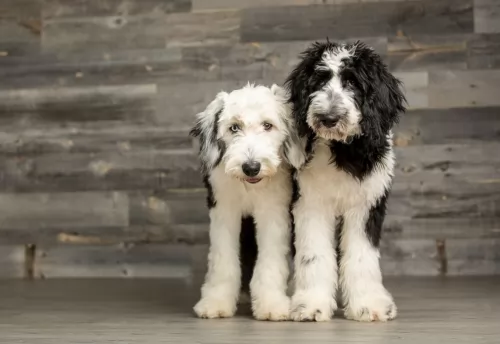 The Mini Sheepadoodles will need quite a lot of exercise as he is an active dog. Walks are always a super idea, and hikes even better. He will love other forms of activities such as ball games, hide and seek, ropes games and general rough and tumble games.
The Mini Sheepadoodles will need quite a lot of exercise as he is an active dog. Walks are always a super idea, and hikes even better. He will love other forms of activities such as ball games, hide and seek, ropes games and general rough and tumble games.
A brush every other day will be required. You can have your pet professionally trimmed. Check him over during brushing for unusual lumps. Check inside his ears and inside his mouth as he can’t tell you about ear infections or a bad tooth causing him a lot of pain.
Provide your wonderful dog with the best food there is. Just like human beings, food plays an important role in good health. Learn to read the labels on commercially manufactured dog foods and try to feed your pet natural, wholesome foods with vitamins and minerals.
Some of the more inferior brands pump their foods full of colorants and preservatives. Try and provide your Mini Sheepadoodle with some home-made food which is simple and free of spices. Things like boiled chicken, brown rice and vegetables chopped up and added to the dry kibble sometimes can do your pet a lot of good.
Make sure his vaccines are up to date and make sure you have a reliable trusted vet to turn to when he is sick.